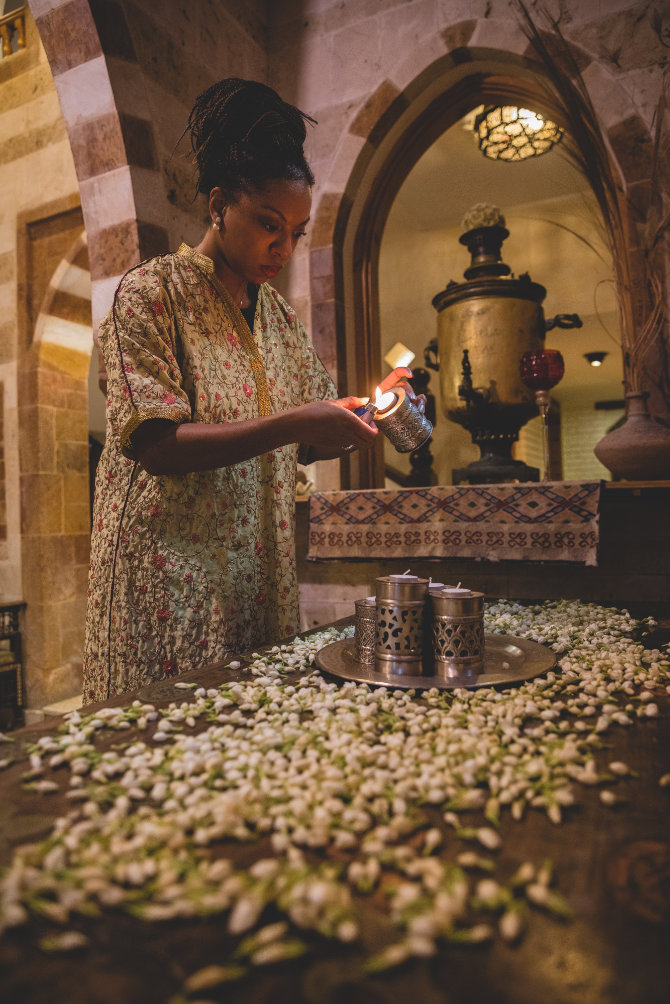RIYADH: Foreign expats living in Saudi Arabia have been resisting the temptation to head home in the wake of the coronavirus disease (COVID-19) pandemic, opting instead to stay put in the Kingdom.
Since the start of the deadly virus outbreak, Saudi authorities have acted quickly to introduce measures aimed at preventing the spread of COVID-19 and ensuring the safety of citizens.
And the government’s moves have reassured many residents from abroad to remain in the Kingdom rather than return to their home countries.
Alexis DeBerry, an events and delegations specialist at King Abdullah University of Science and Technology, told Arab News: “I have been very impressed by the swift actions to safeguard all of the people living in the Kingdom.
I have been very impressed by the swift actions to safeguard all of the people living in the Kingdom.
Alexis DeBerry, events and delegations specialist , King Abdullah University of Science and Technology
“Given the circumstances, I am comforted by the measures taken and the efforts to communicate the adjustments to all.”
On March 30, King Salman ordered that coronavirus treatment be made available for all, including people who had overstayed their visas, one of many announcements made by the Saudi government to care for the population of the country.
“It is moving to see the level of generosity displayed by the Kingdom in ensuring that anyone who gets sick from COVID-19 will not have to worry financially about treatment. I am confident in the way things are being handled here and proud to support the requests to stay at home to help save lives,” added DeBerry.

Alexis DeBerry keeps herself busy in different fun-filled creative activities. (Photo/ Supplied)
She praised the Saudi Health Ministry for its clear communication of COVID-19-related messages via text, social media and other marketing platforms. “I feel safe, calm, and confident that everything I need is right here.”
Despite her family being back in the US, DeBerry opted to stay in the Kingdom, fearing that she could have potentially put her family at risk if she had contracted COVID-19 while traveling to America. “It’s best for me to stay here and stay safe. Everything I need is here,” she said.
In a recent video posted on the US Mission of Saudi Arabia’s social media platforms, American Ambassador to the Kingdom John Abizaid urged the US community in Saudi Arabia to “shelter in place” instead of returning home during the global health crisis.
“Food supply is good, emergency services are sound, medical system is functioning,” said the envoy.
Food supply is good, emergency services are sound, medical system is functioning.
John Abizaid, US ambassador
Jessica Ramalho, a senior consultant at LPC-Omnia International Paris, an advisory and networking agency based in Riyadh, said she had found a way to accommodate her work-life balance during the 24-hour curfew.
“I have a fantastic working environment here where the leadership quickly modified our schedules to allow us to continue our work-life balance with the new regulations in mind.
“I can take a walk around my garden in the morning to clear my mind or reschedule an afternoon meeting as needed if I have to go to the grocery shop or pharmacy before curfew,” she told Arab News.
“Zoom meetings and monday.com are a few of the great ways my team keeps in contact. We even go so far as to have virtual coffee and foul (fava beans) once a week and check in with each other, offering support and sometimes funny updates of what is happening at home.”
Ramalho pointed out that being at home had given her the time and opportunity to try out new food recipes from her Saudi friends and perfect her duggus and tabbouleh dishes. “Virtual cooking sessions on my tablet is extra fun. I am sure some of this would have been possible if I had gone back to the US, but it would not have been the same,” she added.
Although given the chance to take a flight to the UK for returning British nationals, she decided to stay in Saudi Arabia.
Unlike some other countries, the Kingdom was quick to take swift action and measures at an early stage.
Jessica Ramalho, senior consultant at LPC-Omnia International Paris
“Unlike some other countries, the Kingdom was quick to take swift action and measures at an early stage, some of which included suspending international flights, prohibiting foreigners from visiting Makkah, closing public places, enforcing curfews, and so on,” she said.
“It is the result of clear instructions from the government and the consolidation of all these actions that has led to the situation here being contained, giving citizens optimism that life can return to normalcy sooner than in other parts of the world.”
Alexander Sell, the German general manager of the Ritz-Carlton hotel in Jeddah, told Arab News: “I am impressed with the precautionary steps that the Kingdom has taken from the beginning, earlier than most countries.
“The decrees came strong but precise. They felt too much at first but made perfect sense right after. Society has accepted the circumstances and supports it in unity. No discussions about special rules or exceptions, this seems to be the best, fastest and most secure way to overcome the crisis.
“I feel deeply connected with the company, property and country and for me it’s a duty to stay, being with my team and offering support with my presence in such challenging times.”
Sell said he had been passing time doing sports activities, although under the new curfew he has had to switch indoors which has limited space.
“Self-discipline is the most important asset to either nurture or learn now. Establishing a routine, and sticking to it daily, is the best advice I can give. Use your time to trim your body, eat well and healthily, educate yourself with reading and stay positive. The crisis will be over soon and we all will value different, more important things then before COVID-19.”



























